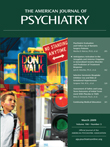Systematic Review and Meta-Analysis of Multiple-Session Early Interventions Following Traumatic Events
Abstract
Objective: The authors sought to determine the efficacy of multiple-session psychological interventions to prevent and treat traumatic stress symptoms beginning within 3 months of a traumatic event. Method: Nine computerized databases were searched, and manual searches were conducted of reference lists of selected articles as well as two journals. In addition, key researchers in the field were contacted to determine whether they were aware of other relevant studies. The reviewers identified randomized controlled trials of multiple-session psychological treatments aimed at preventing or reducing traumatic stress symptoms in individuals within 3 months of exposure to a traumatic event. Details of the studies were independently extracted by two reviewers, and outcome data were entered into the Review Manager software package. Quality assessment was also conducted by two researchers independently. Results: Twenty-five studies examining a range of interventions were identified. For treatment of individuals exposed to a trauma irrespective of their symptoms, there was no significant difference between any intervention and usual care. For treatment of traumatic stress symptoms irrespective of diagnosis, trauma-focused cognitive-behavioral therapy (CBT) was more effective than waiting list or supportive counseling conditions. The difference was greatest for treatment of acute stress disorder and acute posttraumatic stress disorder. Conclusions: Trauma-focused CBT within 3 months of a traumatic event appears to be effective for individuals with traumatic stress symptoms, especially those who meet the threshold for a clinical diagnosis.



